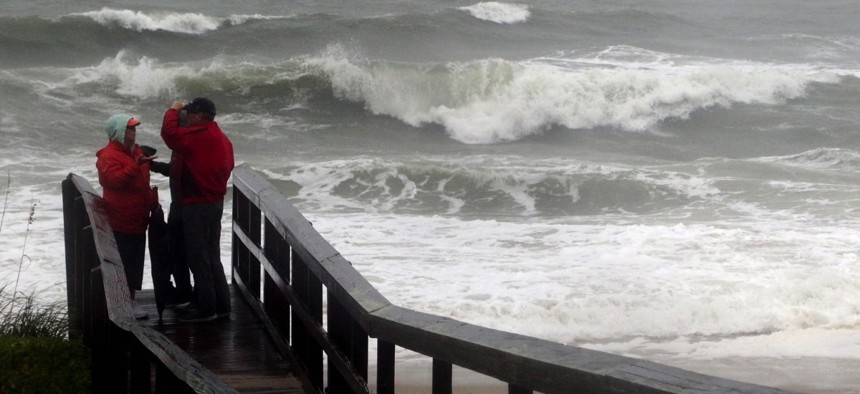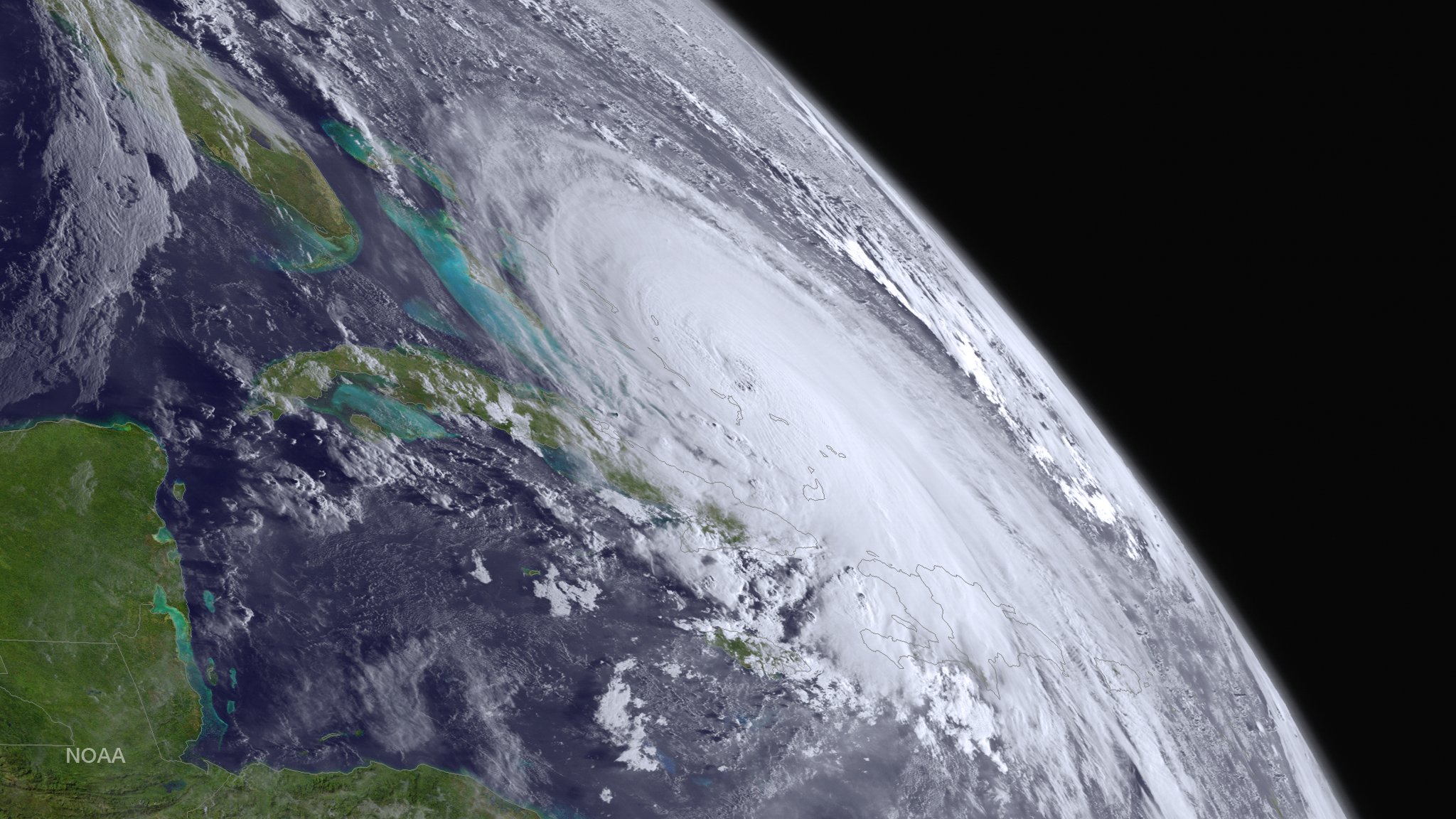State and Local Governments on East Coast Brace for Hurricane Joaquin’s Impacts

People watch the waves in a rainstorm at Atlantic Ocean at Carolina Beach, N. C., Friday, Oct. 2, 2015. Millions along the East Coast breathed a little easier Friday after forecasters said Hurricane Joaquin would probably veer out to sea instead of joinin Harry Hamburg / AP Photo
Connecting state and local government leaders
The storm itself may stay offshore, but that doesn’t mean there won’t be problems on land.
Even as the threat of Hurricane Joaquin making landfall on the east coast of the United States continued to wane on Friday, states throughout the region were bracing for storms and flooding.
As the Category 4 hurricane battered the Bahamas, the latest forecasting models indicated that it would likely head out into the Atlantic as it moves north in the coming days.
But this weekend, a slow moving low pressure system over the southeast is poised to interact with the tropical moisture from the hurricane, according to a National Weather Service forecast updated around noon on Friday. That forecast warned that “historic and life threatening” flash flooding was possible across the western Carolinas and northeast Georgia.
South Carolina Gov. Nikki Haley declared a state of emergency Thursday evening.
And at 12 p.m., South Carolina’s Emergency Management Division upgraded upgraded the state’s “operating condition” to Level 3, a designation that means a disaster or emergency situation is likely. “The heaviest rainfall is still to come,” director Kim Stenson said.

South Carolina was not alone. From northern Florida to Connecticut and as far west as Tennessee, states are on flood alert, with New Jersey, Virginia and North Carolina also issuing states of emergency.
Flash flood watches and coastal flood warnings remained in effect through Saturday for areas in and around Maryland, Washington, D.C., Virginia and West Virginia. Further north, coastal flood and high surf advisories were in place for Long Island and coastal flood warnings were in effect until Saturday on the New Jersey shore.
North Carolina, Gov. Pat McCrory cautioned during a midday press conference that while Hurricane Joaquin would likely stay offshore “there will still be major issues that our state has to deal with.” He specifically noted flooding, high seas, heavy surf and beach erosion.
The governor also warned that North Carolina remains vulnerable to power outages, downed trees and landslides.
McCrory had declared a state of emergency on Thursday which, among other things, waived hour and weight restrictions for truckers responding to the storm.
An emergency operations center was activated on Friday morning. And state officials were planning to meet with representatives from the Federal Emergency Management Agency on Saturday to discuss how the agency would be helping the state to move forward.
All 100 counties in the state had flood or flash flood watches in place on Friday, and flood warnings for some counties near rivers were expected to continue into next week.
A mandatory evacuation order was in place through tomorrow for Ocracoke Island, which is located off the state’s coast in a row of barrier islands known as the Outer Banks. The governor said that since the evacuation order was issued yesterday, the state’s ferry division had taken 485 vehicles and nearly 1,100 passengers off the island.
Evacuations took place at Cape Lookout National Park as well, which is also located among the barrier islands.
And, in the Outer Banks town of Atlantic Beach, the police chief issued a statement, which said local officials were recommending that “anyone who is uncomfortable or wishes to leave town until the storm passes do so before tropical storm force conditions begin later this weekend.”
Throughout North Carolina, search and rescue and swiftwater rescue teams were on standby.
Mike Sprayberry, director of the state’s Division of Emergency Management, said that 15 swiftwater teams were stationed in the western part of the state. He also said that while Black Hawk, Lakota, and Bell 407 helicopters were available to deploy through partnerships with the National Guard and the state’s Highway Patrol, he did not anticipate that the aircraft would be able to fly until Sunday, or Sunday afternoon, due to poor weather conditions.
“If the rivers begin to rise and crest we would still have those available to us next week,” he explained during the same press conference where McCrory spoke.
On Thursday, one death occurred when a tree fell across Interstate 95, north of Fayetteville, North Carolina, hitting two vehicles. “We hope that’s the only one,” the governor said.
Though meteorologists have tempered their original rainfall predictions from 7 to 10 inches to 4 to 6 inches statewide for Virginia, state transportation officials there have warned travel will remain hazardous, and 800 National Guard troops have been activated.
Gov. Terry McAuliffe declared a state of emergency on Wednesday.
“The forecast of up to 10 inches of rain in areas across Virginia could result in floods, power outages and a serious threat to life and property,” he said in a statement “As we continue to track the path of Hurricane Joaquin, I have instructed the Secretary of Public Safety and Homeland Security to make every preparation for a major event Thursday and Friday.”
Among cities in the region, Norfolk, Virginia, which is only 13 feet above sea level, has particular cause for worry. Mayor Paul Fraim on Wednesday declared a state of emergency to coincide with the state declaration.
Heavy rainfall, coupled with high tides, prevents stormwater from easily draining in Norfolk.
But the city’s long-term flood management strategy appears promising. And like most other coastal cities along the eastern seaboard, its public works department has been hard at work clearing storm drains in preparation for the coming weather.
"Please don’t drive in the floodwaters,” said Jim Redick, Norfolk director of emergency operations, in a Wednesday Facebook video appeal to residents. “We’re going to get significant flooding to the point of nor’easters back in 2009,” he added, referring to previous disruptive coastal storms.
The Norfolk District Survey and Navigation team is on call throughout the weekend, and a reservoir has been opened.
Norfolk’s plans will also likely involve a data analytics platform from Palo Alto, California-based Palantir Technologies, which will be used to monitor the flood risk of the city’s approximately 60,000 parcels, in conjunction with TITAN—Tidal Inundation Tracking Application for Norfolk—flood gauges in bay waters near the city.
Norfolk is currently a contender for up to $500 million in the U.S. Department of Housing and Urban Development Exchange’s National Disaster Resilience Competition. A hurricane there could be the push judges need to fund a revitalization of the city’s flood-vulnerable neighborhoods.
Throughout the day, cancellations of city events, and services like trash, recycling and bulk waste pickup for Friday, appeared on Norfolk’s Twitter account, as did tweets encouraging citizens to sign up for Nixle flooding alerts.
Further north, Maryland Gov. Larry Hogan issued a state of emergency Thursday, and Baltimore Public Works was making flood preparations. Flooding in low-lying areas, prompted Delaware Gov. Jack Markell to declare a limited state of emergency for Sussex County.
In New York, with the shadow of superstorm Sandy as a backdrop, Gov. Andrew Cuomo said during a conference call with reporters on Friday afternoon that the state was not letting its guard down, even though it was not looking like it would get hit with the brunt of Joaquin.
“We’re not getting complacent here, because weather reports change,” the governor said.
On Friday, Department of Environmental Conservation staff were working to clear debris from streams, and the Department of Transportation was doing the same with drainage culverts.
Since Sandy, Cuomo noted there had been new equipment, systems and barriers put in place to deal with the impact from storms and severe weather in and around New York City.
“We’re making sure that everything is ready to go, just in case,” he said.
Jim Malatras, director of state operations in New York, said that 150 parks personnel were constructing sand berms and other barriers to protect against flooding at facilities on Long Island, including Jones Beach, Robert Moses State Park and Hither Hills State Park. He also said the state had 220,000 sandbags on hand.
In downstate New York, strategic stockpiles are in place that include 200 generators, 145,000 meals, 212,000 bottles of water, 209 water pumps, 2.5 million gallons of fuel in a reserve in Suffolk County, 250 high axle trucks and 20 National Guard helicopters.
An array of other equipment and resources had also been prepared for deployment, such as front-end loaders and swiftwater rescue vehicles.
The Metropolitan Transportation Authority, which operates the New York City subway system, had readied pumps and generators, as well as chainsaws and other equipment that can be used to clear trees from aboveground tracks, according to Thomas Prendergast, the authority’s chairman and CEO. Based on the current forecast, Prendergast said the agency was not anticipating widespread shutdowns, though he said temporary ones are a possibility.
Cuomo was also urging New Yorkers on Friday to sign up for emergency phone alerts using the state’s NY-Alert system.
In North Carolina, Governor McCrory also expressed concern about the how the nasty weather would affect agriculture. He noted that peanut and cotton farmers were currently harvesting.
North Carolina Agriculture Commissioner Steve Troxler said there was the potential for crops to be damaged, including tobacco. Power failures could affect livestock and poultry operations as well, he said. A hotline had been setup for farmers that needed assistance due to the weather.
“There are times that, quite frankly, in the ag community that you depend on neighbors to help neighbors, but when everybody has got the same problem, sometimes somebody needs to come in to help round up livestock,” he said, “to help put a fence up, maybe to help cut trees.”
Joaquin is expected to slowly weaken in the next 48 hours, according to the National Weather Service. Category 4 is the second strongest level on the Saffir-Simpson wind scale. Reports from an Air Force Reserve Hurricane Hunter aircraft indicated that maximum sustained winds on Friday were near 130 miles per hour, with higher gusts.
Bill Lucia is a Reporter and Dave Nyczepir a News Editor for Government Executive’s Route Fifty.

NEXT STORY: How NYC is untangling the tech-hiring knot


